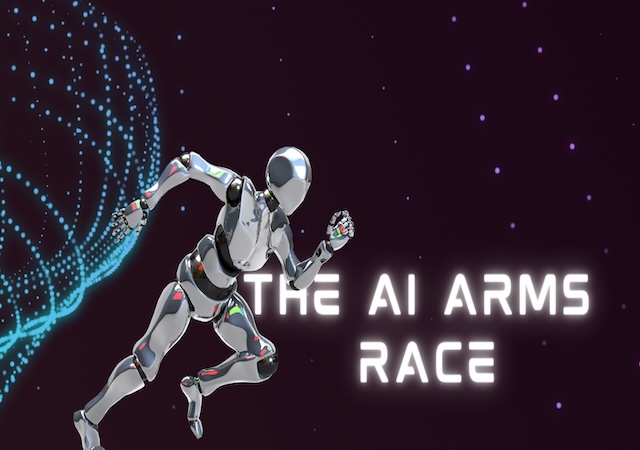March 5th, 2025
AI
In the 20th century, the world was gripped by the Cold War, a decades-long struggle for global dominance between superpowers, defined by the race to build the most advanced nuclear weapons. Today, a new and equally transformative competition has emerged: the race to dominate artificial intelligence (AI). Unlike the nuclear arms race, which was largely confined to a few nations, the AI race is a global contest involving not only nations but also corporations, research institutions, and even individuals. This new arms race is reshaping geopolitics, economies, and societies, with profound implications for the future of humanity.
AI is no longer just a technological innovation; it has become a strategic asset. Nations recognize that AI has the potential to revolutionize industries, enhance military capabilities, and redefine power dynamics. From autonomous weapons systems to AI-driven surveillance, from predictive analytics to natural language processing, AI is permeating every aspect of modern life. Its applications are vast, ranging from healthcare and education to finance and defense.
The countries that lead in AI development will likely dominate the global economy and wield significant geopolitical influence. As a result, governments around the world are investing heavily in AI research and development, creating national strategies, and competing to attract top talent. The stakes are high, and the race is intensifying.
The United States and China are currently the frontrunners in the AI race, each with distinct advantages. The U.S. boasts a robust ecosystem of tech giants like Google, Microsoft, and OpenAI, world-class universities, and a culture of innovation. China, on the other hand, has a centralized government that can mobilize resources on an unprecedented scale, a vast population that generates massive amounts of data, and a clear national strategy to become the global AI leader by 2030.
Other nations are also vying for a piece of the AI pie. The European Union is focusing on ethical AI development and regulation, aiming to balance innovation with privacy and human rights. Countries like the United Kingdom, Canada, and Israel are leveraging their strong academic and entrepreneurial ecosystems to make significant contributions to AI research. Meanwhile, emerging economies such as India and Brazil are investing in AI to drive economic growth and address societal challenges.
One of the most contentious aspects of the AI arms race is its military applications. Autonomous drones, cyber warfare, and AI-powered decision-making systems are transforming the nature of conflict. Nations are developing AI-driven technologies to gain a strategic edge, raising concerns about the potential for an AI-fueled arms race that could destabilize global security.
The use of AI in warfare also raises ethical questions. How much autonomy should be granted to machines in life-and-death decisions? What happens if AI systems malfunction or are hacked? The lack of international norms and regulations governing the use of AI in military contexts adds to the uncertainty and risk.
Beyond the military realm, the AI race is reshaping the global economy. AI is driving productivity, creating new industries, and disrupting existing ones. Countries that fail to keep pace risk being left behind, with significant consequences for their economic competitiveness and standard of living.
The concentration of AI expertise and resources in a few nations and corporations has also raised concerns about inequality. Will the benefits of AI be shared broadly, or will they accrue to a small elite? How can we ensure that AI development is inclusive and equitable?
The AI arms race is not just about technology; it is also about values. Different nations have different approaches to AI development, reflecting their cultural, political, and ethical priorities. For example, while Western countries emphasize transparency, accountability, and individual rights, China prioritizes state control and social stability.
These divergent approaches raise important questions about the future of AI. Will the global AI landscape be characterized by cooperation or competition? Can we establish common standards and norms to ensure that AI is developed and used responsibly? How do we address the potential for AI to exacerbate existing inequalities and create new ones?
While competition can drive innovation, the AI arms race also underscores the need for global cooperation. The challenges posed by AI—from ethical dilemmas to security risks—are too great for any one nation to tackle alone. International collaboration is essential to establish norms, share knowledge, and ensure that AI is used for the benefit of all humanity.
Organizations like the United Nations, the OECD, and the Global Partnership on AI are working to foster dialogue and cooperation on AI governance. However, much more needs to be done to build trust and create a framework for responsible AI development.
The AI arms race is a defining feature of the 21st century, with far-reaching implications for global power, security, and prosperity. As nations and corporations compete to harness the potential of AI, we must also grapple with the ethical, societal, and geopolitical challenges it presents. The choices we make today will shape the future of AI—and the future of humanity. Will we use AI to build a better world, or will we allow it to become a source of division and conflict? The answer lies in our ability to balance competition with cooperation, innovation with responsibility, and ambition with wisdom. The race is on, and the stakes could not be higher.